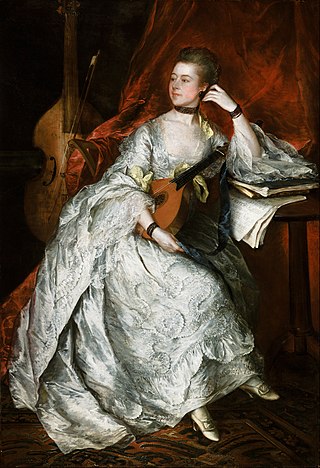Related Research Articles

Edward Hyde, 1st Earl of Clarendon was an English statesman, lawyer, diplomat and historian who served as chief advisor to Charles I during the First English Civil War, and Lord Chancellor to Charles II from 1660 to 1667.

Earl of Castlehaven was a title in the Peerage of Ireland, created on 6 September 1616. It was held in conjunction with the Barony of Audley, the Barony of Audley of Orier, and the Barony of Audley of Hely.

George Tuchet, 1st Earl of Castlehaven, was the son of Henry Tuchet, 10th Baron Audley and his wife, née Elizabeth Sneyd.

Mervyn Tuchet, 2nd Earl of Castlehaven, was an English nobleman who was convicted of rape and sodomy and subsequently executed.

James Tuchet, 3rd Earl of Castlehaven was the son of Mervyn Tuchet, 2nd Earl of Castlehaven and his first wife, Elizabeth Barnham. Castlehaven played a prominent role in the Wars of the Three Kingdoms that took place in the middle of the 17th century, and was particularly active in the conflicts in Ireland at this time.

Mervyn Tuchet, 4th Earl of Castlehaven was the third son of Mervyn Tuchet, 2nd Earl of Castlehaven, and his first wife, Elizabeth Barnham. He succeeded his brother James Tuchet as Earl of Castlehaven on 11 October 1684. He also held the subsidiary titles 14th Baron Audley and 2nd Baron Audley of Hely.

Baron Audley is a title in the Peerage of England first created in 1313, by writ to the Parliament of England, for Sir Nicholas Audley of Heighley Castle, a member of the Anglo-Norman Audley family of Staffordshire.
Thomas Preston, 1st Viscount Tara was an Irish soldier of the 17th century. After lengthy service as a mercenary in the Spanish Army, Preston returned to Ireland following the outbreak of the Rebellion of 1641. He was appointed to command the Leinster Army of the Irish Confederacy, enjoying some success as well as a number of heavy defeats such as the Battle of Dungans Hill in 1647 where his army was largely destroyed. Like other Confederate leaders, Preston was a Catholic Royalist. He remained in close contact with the Lord Lieutenant the Marquess of Ormonde, and was a strong supporter of an alliance between Confederates and Royalists against the English Republicans.
The Privy Council of Scotland was a body that advised the Scottish monarch. In the range of its functions the council was often more important than the Estates in the running the country. Its registers include a wide range of material on the political, administrative, economic and social affairs of the Kingdom of Scotland. The council supervised the administration of the law, regulated trade and shipping, took emergency measures against the plague, granted licences to travel, administered oaths of allegiance, banished beggars and gypsies, dealt with witches, recusants, Covenanters and Jacobites and tackled the problem of lawlessness in the Highlands and the Borders.
Dom Serenus Cressy, O.S.B.,, was an English convert to Catholicism and Benedictine monk, who became a noted scholar in Church history.

Captain Philip Thicknesse was a British Army officer and writer who was a friend of the artist Thomas Gainsborough. He wrote several travel guides.

Columba Marmion O.S.B, born Joseph Aloysius Marmion was a Benedictine Irish monk and the third Abbot of Maredsous Abbey in Belgium. Beatified by Pope John Paul II on September 3, 2000, Columba was one of the most popular and influential Catholic authors of the 20th century. His books are considered spiritual classics.
John Talbot, 10th Earl of Shrewsbury, 10th Earl of Waterford, was an English nobleman.
Touchet is a surname, and may refer to:
Events from the year 1631 in England.
George Tuchet may refer to:
Richard Butler of Kilcash was an Irish soldier and landowner, the third son of Thomas Butler, Viscount Thurles and brother of James, 1st Duke of Ormonde. He sided with the Irish Confederacy at the Irish Rebellion of 1641. He scouted the enemy on the morning of the Battle of Cloughleagh. His descendants succeeded to the earldom of Ormond when the senior branch of the family failed in 1758.

The Battle of Cloghleagh, also known as the Battle of Funcheon Ford or the Battle of Manning Water, was fought between a Royalist force and an Irish Confederate force during the Irish Confederate Wars. It took place south of Kilworth and north of Fermoy between the River Funshion and the River Blackwater in County Cork on 4 June 1643. The result was an Irish Confederate victory.
Edmund Borlase (1620–1682) was an Anglo-Irish historian and physician.
Sir Piers Crosby (1590–1646) was an Irish soldier and politician. Crosby was also a leading Irish magnate, owning various estates across the island. He was a man of strong and determined character, and had sufficient political skills to help bring about the downfall and death of the Earl of Stafford, who in the 1630s had been virtually all-powerful in Ireland.
References
- ↑ George Anselm Touchet
- ↑ Thompson Cooper, ‘Touchet, George (d. before 1689?)’, rev. Dom Aidan Bellenger, Oxford Dictionary of National Biography , Oxford University Press, 2004, accessed 10 Jan 2009
- ↑ Michael Mullett, in his introduction to fascimile extracts from Historical collections, claims The Secret Paths of Divine Love was published by the Ascetical Society in 1858. Mullett, ed., English Catholicism 1680-1830. Volume I. English Catholic Writings on Religious Controversies 1685-1736, 2006, pp. 217-8